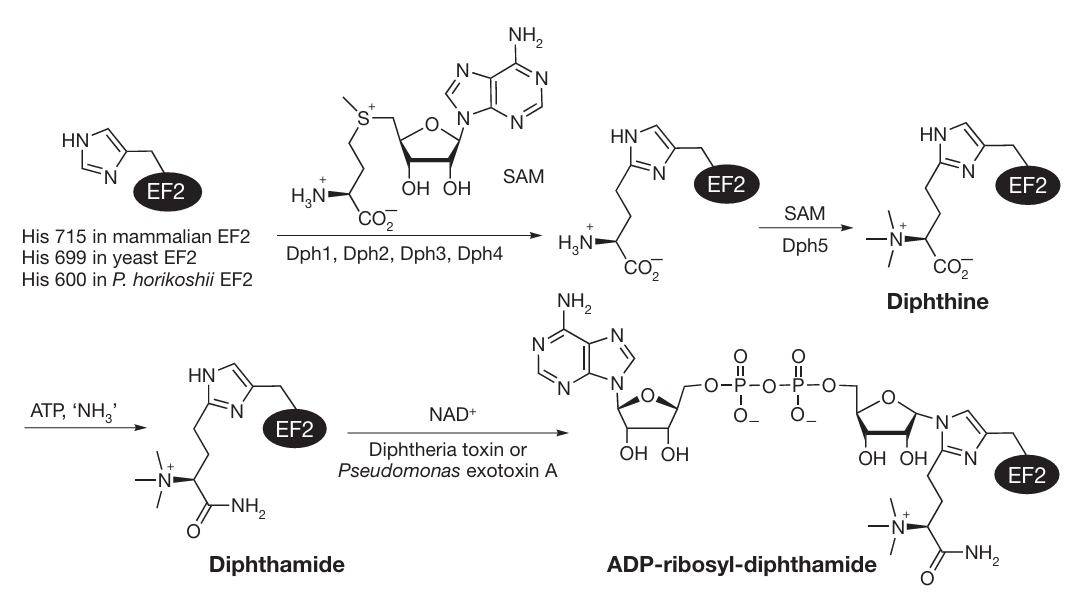Diphthamide Analysis Service
Diphthamide is a unique and highly conserved post-translational modification (PTM) that occurs on a specific histidine residue of eukaryotic elongation factor 2 (eEF2). This rare modification is essential for maintaining translational fidelity and plays critical roles in protein synthesis regulation.
MtoZ Biolabs offers end-to-end Diphthamide Analysis Services designed to help researchers comprehensively study this important modification. We employ advanced methodologies including mass spectrometry-based detection, antibody-based immunoassays, chemical labeling techniques, and nuclear magnetic resonance (NMR) spectroscopy to ensure precise and multidimensional characterization. NMR enables direct structural analysis of diphthamide-modified proteins, complementing site-specific identification by mass spectrometry. Bioinformatics pipelines are applied to integrate these results into pathway and network analyses, offering valuable insights into translational control and disease mechanisms. Whether the focus is targeted protein validation or global proteomic screening, our customizable workflows provide the flexibility to adapt to diverse experimental designs and research objectives.
1. Target Protein Diphthamide Analysis
For studies centered on eEF2 or engineered protein constructs, MtoZ Biolabs offers targeted diphthamide analysis to confirm modification sites and quantify modification levels under different biological states.
2. Diphthamide Proteomics
For broader investigations, our diphthamide proteomics workflow enables large-scale screening of diphthamide-modified proteins and associated regulatory pathways. This service allows comparative profiling and pathway-level interpretation, helping researchers elucidate how diphthamide influences translational control across different systems.
What is Diphthamide?
Diphthamide is a post-translationally modified histidine residue located at a conserved site on eEF2. Its biosynthesis is a multi-step process requiring several dedicated enzymes (DPH1–DPH7) that sequentially transform histidine into diphthamide through transfer of a 3-amino-3-carboxypropyl group followed by additional modifications. This highly conserved process reflects its evolutionary importance, as diphthamide is present in nearly all eukaryotes and archaea.

Zhang, Y. et al. Nature. 2010.
Figure 1. The Structure of Diphthamide and Its Biosynthesis Pathway
Functionally, diphthamide ensures the accuracy of translation by stabilizing the ribosome and preventing it from slipping backward by one nucleotide, a process known as -1 frameshifting, during protein elongation. Loss of diphthamide biosynthesis has been linked to reduced translational fidelity, impaired cell growth, and susceptibility to cellular stress. Moreover, diphthamide is the specific target of diphtheria toxin and Pseudomonas exotoxin A, which ADP-ribosylate eEF2 at the diphthamide site, leading to inhibition of protein synthesis and cell death. Beyond its established role in translation, emerging research suggests that diphthamide may influence stress responses, tumorigenesis, and neurodevelopmental processes. Defects in genes encoding diphthamide biosynthetic enzymes have been associated with rare human genetic disorders and may contribute to cancer progression. Thus, systematic analysis of diphthamide is critical for understanding both fundamental biology and disease mechanisms.
Analysis Workflow

Sample Submission Suggestions
1. Sample Types
Cell lysates, tissues, biofluids (plasma, serum, CSF), or purified proteins. For other types, please contact us in advance for tailored preparation guidance.
2. Storage
Snap-freeze samples in liquid nitrogen and store at –80°C.
3. Shipping
Ship on dry ice to maintain modification stability.
4. Replicates
Biological replicates are recommended for statistical reliability.
Service Advantages
✅ Precision: High-resolution LC-MS/MS ensures accurate site-level identification and quantification.
✅ Sensitivity: Enrichment workflows enable detection of low-abundance diphthamide-modified peptides.
✅ Comprehensiveness: End-to-end services covering sample preparation, enrichment, MS detection, validation, and bioinformatics.
✅ Customization: Flexible workflows tailored to research objectives and sample types.
✅ Expertise: A highly skilled team with extensive experience in PTM and translational research ensures reliable interpretation and technical support.
Deliverables
1. Comprehensive Experimental Details
2. Materials, Instruments, and Methods
3. Total Ion Chromatogram & Quality Control Assessment
4. Data Analysis, Preprocessing, and Estimation
5. Bioinformatics Analysis
6. Raw Data Files
Diphthamide represents a rare but biologically critical modification that links translational control with disease mechanisms. With its advanced mass spectrometry platforms, enrichment technologies, and bioinformatics expertise, MtoZ Biolabs provides a reliable and comprehensive Diphthamide Analysis Service. Contact us today to discuss your project and request a customized proposal!







